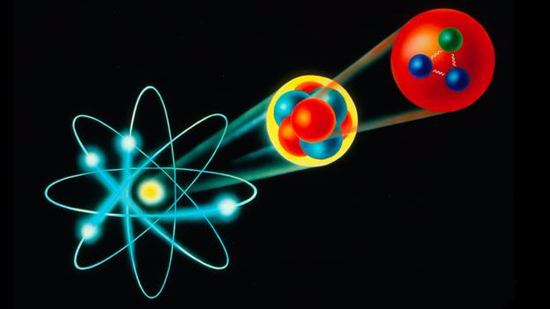(单词翻译:单击)
They are also fantastically durable. Because they are so long lived, atoms really get around. Every atom you possess has almost certainly passed through several stars and been part of millions of organisms on its way to becoming you. We are each so atomically numerous and so vigorously recycled at death that a significant number of our atoms—up to a billion for each of us, it has been suggested—probably once belonged to Shakespeare. A billion more each came from Buddha and Genghis Khan and Beethoven, and any other historical figure you care to name. (The personages have to be historical, apparently, as it takes the atoms some decades to become thoroughly redistributed; however much you may wish it, you are not yet one with Elvis Presley.)
原子还不可思议地长寿。由于原子那么长寿,它们真的可以到处漫游。你身上的每个原子肯定已经穿越几个恒星,曾是上百万种生物的组成部分,然后才成为了你。我们每个人身上都有大量原子;这些原子的生命力很强,在我们死后可以重新利用;在我们身上的原子当中,有相当一部分——有人测算,我们每个人身上多达10亿个原子——原先很可能是莎士比亚身上的原子,释迦牟尼、成吉思汗、贝多芬以及其他你点得出的历史人物又每人贡献10亿个原子。(显然非得是历史人物,因为原子要花大约几十年的时间才能彻底地重新分配;无论你的愿望多么强烈,你身上还不可能有一个埃尔维斯·普雷斯利的原子。)
So we are all reincarnations—though short-lived ones. When we die our atoms will disassemble and move off to find new uses elsewhere—as part of a leaf or other human being or drop of dew. Atoms, however, go on practically forever. Nobody actually knows how long an atom can survive, but according to Martin Rees it is probably about 10 35 years—a number so big that even I am happy to express it in notation.
因此,我们都是别人转世化身来的——虽然是短命的。我们死了以后,我们的原子就会天各一方,去别处寻找新的用武之地——成为一片叶子或别的人体或一滴露水的组成部分。而原子本身实际上将永远活下去。其实,谁也不知道一个原子的寿命,但据马丁·里斯说,它的寿命大约为10^35年——这个数字太大,连我也乐意用数学符号来表示。


